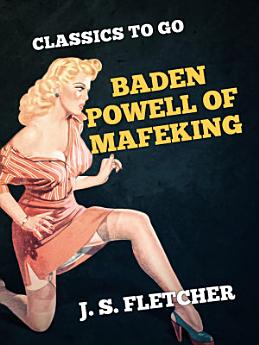Baden Powell of Mafeking
јун 2019. · Otbebookpublishing
E-knjiga
104
Stranica
family_home
Ispunjava uslove
info
reportOcene i recenzije nisu verifikovane Saznajte više
O ovoj e-knjizi
Excerpt: "It may well and fittingly be complained that of late years we English folk have shown an unpardonable spirit of curiosity about things which do not concern us. We have brought into being more than one periodical publication full of gossip about the private life and affairs of folk of eminence, and there are too many of us who are never so much pleased as when we are informed that a certain great artist abhors meat, or that a famous musician is inordinately fond of pickled salmon. There was a time when, to use a homely old phrase, people minded their own business and left that of their neighbours' alone — that day in some degree seems to have been left far behind, and most of us feel that we are being defrauded of our just rights if we may not step across the threshold of my lady's drawing-room or set foot in the statesman's cabinet. The fact is that we have itching ears nowadays, and cherish a passion for gossip which were creditable to the old women of the open doorways. We want to know all — which is to say as much as chance will tell us — about the people of whom the street is talking, and the more we can hear of them, even of the things which appertain in reality to no one but themselves, the better we are pleased. But even here, in what is undoubtedly an evil, there is an element of possible good which under certain circumstances may be developed into magnificent results. Since we must talk amongst ourselves, since we must satisfy this very human craving for what is after all gossip, let us find great subjects to gossip about. If we must talk in the streets let us talk about great folk, about great deeds, about great examples, and since our subjects are great let us talk of them in a great way. There is no need to chatter idly and to no purpose — we shall be all the better if our gossip about great men and great things leads us to even a faint imitation of both."
O autoru
J. S. Fletcher, born Joseph Smith Fletcher on February 7, 1863, in Halifax, West Yorkshire, was a prolific British author whose literary career spanned several genres, including historical fiction, poetry, and journalism. Fletcher's early life was marked by tragedy; he was orphaned at the age of eight and subsequently raised by his grandmother. This challenging upbringing perhaps fueled his later prolific output and keen observational skills.Fletcher initially pursued a career in law but soon turned to writing, producing over 200 books throughout his lifetime. He is best known for his detective fiction, particularly the novel "The Middle Temple Murder" (1919), which garnered significant acclaim and established him as a master of the genre. His work in crime fiction was characterized by intricate plots, well-developed characters, and a deep understanding of the human psyche, which influenced contemporary writers such as Agatha Christie and Dorothy L. Sayers.A notable controversy in Fletcher's career involved his outspoken criticism of the British legal system, which he often depicted as flawed and corrupt in his novels. This critique resonated with readers and added a layer of social commentary to his work, making him a somewhat revolutionary figure in the literary world.Fletcher's influence extended beyond his lifetime, as his meticulous approach to plotting and character development set a standard for future generations of mystery writers. His ability to weave historical context into his narratives also provided a rich tapestry that continues to captivate modern readers. J. S. Fletcher passed away on January 30, 1935, leaving behind a legacy that endures in the annals of British literature.
Ocenite ovu e-knjigu
Javite nam svoje mišljenje.
Informacije o čitanju
Pametni telefoni i tableti
Instalirajte aplikaciju Google Play knjige za Android i iPad/iPhone. Automatski se sinhronizuje sa nalogom i omogućava vam da čitate onlajn i oflajn gde god da se nalazite.
Laptopovi i računari
Možete da slušate audio-knjige kupljene na Google Play-u pomoću veb-pregledača na računaru.
E-čitači i drugi uređaji
Da biste čitali na uređajima koje koriste e-mastilo, kao što su Kobo e-čitači, treba da preuzmete fajl i prenesete ga na uređaj. Pratite detaljna uputstva iz centra za pomoć da biste preneli fajlove u podržane e-čitače.








